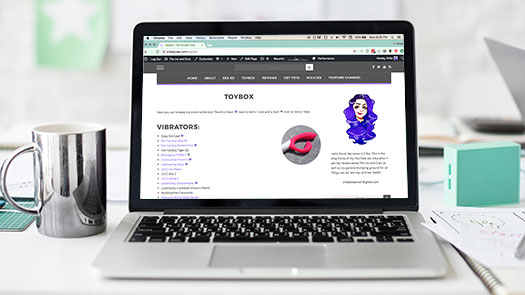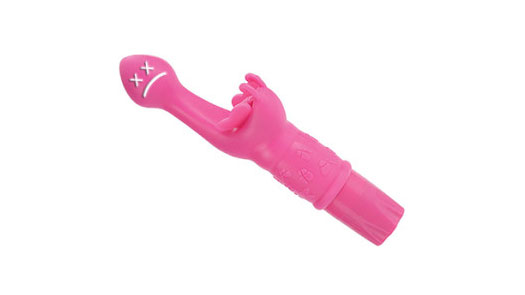What kind of soap can you use on your vibrator? How do you disinfect your dildos? I’ve got the answers.
(Note: I uploaded this video to my YouTube channel over a year ago but never actually published the transcript here like I usually do, so I’m fixing that now since I’m about to finally start posting new content again. So if you’re confused because this post is new but the video isn’t, that’s why!)

I can’t believe I’ve never made a video about sex toy cleaning because this is something I get asked about all the time, and there’s some weird myths and misconceptions about this topic.
So let’s have a chat. “Erika,” you say, “how do I clean my dildos?”
Well, there are multiple different levels of toy material safety and also multiple different levels of cleaning that might be necessary for different uses.
So let’s start with a very brief overview of materials.
As I say all the time, the sex toy industry is unregulated and a lot of companies simply do not give a shit about your safety. You have PVC and mystery rubbers that are sometimes softened with toxic plasticizers. You have TPE/TPR toys that are probably non-toxic but still porous enough to harbor bacteria and mold.
The kinds of materials that you want to stick with for anything coming in contact with your mucous membranes— so that’s your vagina, your rectum, your outer vulva, your mouth, the glans of your penis if you are uncircumcised (a lot of people don’t realize that’s a mucous membrane, but it is)— are the same kinds of materials you would expect to find in your kitchen. Things like silicone, stainless steel, glass. If a material is safe to come in contact with your food and mouth, if it’s not going to leach anything that could harm your digestive system, then it’s pretty much fine for sex toy use.
So these are the materials I’m going to be focusing on when I talk about how to clean your sex toys because those other highly porous materials pretty much can’t be effectively sanitized beyond the surface anyway.
If you have a body-safe toy that you are not sharing with anyone else, are not using in more than one orifice, and you haven’t recently had something like a yeast or bacterial infection, soap and water is perfectly fine to clean your toy between uses.
Some people will try to sell you on specialty toy cleaners, but those are not necessary, and I’ll come back to that topic in a minute.
When it comes to soap, really any kind of soap will work, but some are better than others. For example, a lot of soaps made for use on the skin (your hand soaps, your body washes, etc.) do not rinse 100% clean very easily. They’re made to leave moisturizers behind to keep your skin soft, but those moisturizers can also sometimes cause irritation internally if they’re hanging around on your toys. So those kinds of soaps will work in a pinch, but you need to rinse them extra well, really scrub and make sure there isn’t any residue left.
A better choice, in my opinion, is dish soap. Dish soaps are made to rinse completely clean, and they cut through things like lube and body fluids a lot easier than more gentle skin soaps. I’m also a really big fan of Dr. Bronner’s soap for toy cleaning. That’s actually what I use most of the time.
When it comes to soap ingredients, you ideally want to look for something that’s silicone-free if you’re using it on silicone toys. So make sure there aren’t any ingredients that end in either -cone or -siloxane. I don’t know that the small amount of silicone sometimes found in soaps would be enough to actually harm a silicone toy at all, but better safe than sorry, right? If your body is really sensitive you may also want to avoid soaps with fragrance in them. I’ve always used fragranced soaps for my toy cleaning and have never had an issue, but I’m not very sensitive in general so your mileage may vary on that.
For fairly smooth toys, you can just wet them and then scrub with soapy hands. For toys with a lot of texture and crevices, it can be useful to have a dedicated sex toy cleaning toothbrush to get into all the little nooks and crannies. If the toy isn’t waterproof or splashproof, consider using a wet cloth instead of running it under the tap.
Now, like I said, some people will say that you should only ever use sex toy cleaning foams and sprays and that anything else is going to degrade your toy.
And this idea mainly comes from a time when the less safe, really porous sex toy materials were the overwhelming majority and also when companies very frequently lied about their materials and called things silicone that were not silicone. (Which is something you still see from less reputable places like some Amazon listings, for example.)
And when it comes to those porous materials, it is true that they often can’t handle soap. But body-safe, effectively non-porous materials like silicone absolutely can. Again, these are the exact same materials you use in your kitchen. You’re probably not getting out a specialty cleaner for your silicone baking mats or ice cube trays or spatulas. Soap is fine.
But there are times when you need a more thorough disinfecting.
Maybe you want to use something vaginally that you’ve previously used in your butt. Maybe you want to share a toy with a partner you’re not fluid-bonded with. Maybe you’ve recently had an infection and want to make sure you’re not going to re-infect yourself.
In those cases, you have a few options depending on what your toy is made of.
In my opinion, the easiest way to disinfect most sex toys is with some 70% isopropyl alcohol. This is safe for almost all body-safe materials. Occasionally you’ll hear a silicone toy brand warn against it, but in my experience that’s always been for vibrators that have a polyurethane coating over the silicone (which you can tell a silicone toy has a PU coat if has a really silky, kind of dust-resistant finish). This may also apply to hard plastic vibrators with PU coats. Regular uncoated silicone and plastic should be fine, but always read your user manual if there is one and consider double checking with the manufacturer.
Some toys, particularly non-electronic silicone toys, can also be boiled. Get the water bubbling, pop the toys in for about 5 minutes, make yourself some dildo soup. I’m kidding— please don’t ingest dildo water. You can also boil stainless steel and some types of glass (check with the manufacturer), but it wouldn’t be my first choice method because if they knock against the pot it could cause damage. And those materials also really retain heat, so you’d have to let them cool down for a long time before they’d be safe to handle.
You can also do a brief 3-5 minute soak in a bleach solution— bleach diluted in cold water. The exact ratio is kind of up to your discretion. A lot of companies and educators say to do 10% (one part bleach to nine parts water), but that ratio kind of seems like overkill to me because it’s way higher than the CDC recommends for disinfecting non-porous surfaces outside of hospital settings. Generally when you buy household bleach there will be instructions on the label for diluting, so just follow that.
Bleach solutions are fine for silicone, ABS hard plastic, and glass. I would be careful with metal toys or vibrators that have exposed metal parts for charging because bleach is corrosive to metal. njoy, one of the main stainless steel toy companies, say that bleach solutions are okay for their toys as long as you only soak for three minutes and then immediately wash the toy with soap and water. For other metal toy brands, I would avoid it or talk to the manufacturer. If it’s a vibrator that just has little metal charging bits towards the bottom, you can sometimes just hold onto the end and soak the main body of the toy without letting the bleach touch the metal.
Some people claim you can get away with not disinfecting between people or orifices if you use a condom on the toy.
That may or may not be true depending on the specific toy. For example, some toys have flared bases or balls that can sometimes still come in direct contact with your nether regions even with a condom, so in those cases I would still err on the side of caution and disinfect. It’s also important to keep in mind that the majority of condoms come pre-lubricated with silicone lube, which can sometimes affect silicone toys, and they usually won’t list the lube ingredients on the packaging (which is extremely annoying). So I recommend sticking with unlubricated condoms for silicone sex toys.
For more niche materials like wood and ceramic, always consult the manufacturer for best cleaning practices because it’s going to vary from brand to brand depending on what kind of finish they use.
Okay, that was a lot of information, and I still feel like I maybe didn’t cover everything so if you have any other questions please drop them down below. Hopefully this was helpful. Let me know if there’s any other subjects you’d ever like to see me cover in a video. And as always, thanks for watching, and I’ll see you next time!




